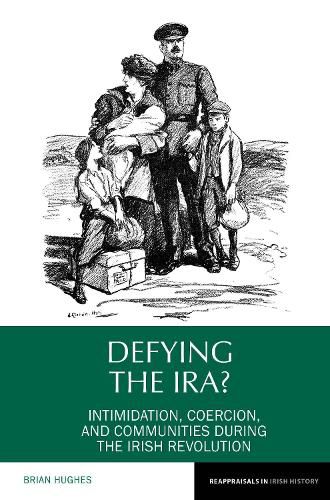Readings Newsletter
Become a Readings Member to make your shopping experience even easier.
Sign in or sign up for free!
You’re not far away from qualifying for FREE standard shipping within Australia
You’ve qualified for FREE standard shipping within Australia
The cart is loading…






An Open Access edition of this book is available on the Liverpool University Press website and the OAPEN library.
This book examines the grass-roots relationship between the Irish Republican Army (IRA) and the civilian population during the Irish Revolution. It is primarily concerned with the attempts of the militant revolutionaries to discourage, stifle, and punish dissent among the local populations in which they operated, and the actions or inactions by which dissent was expressed or implied.
Focusing on the period of guerilla war against British rule from c. 1917 to 1922, it uncovers the acts of ‘everyday’ violence, threat, and harm that characterized much of the revolutionary activity of this period. Moving away from the ambushes and assassinations that have dominated much of the discourse on the revolution, the book explores low-level violent and non-violent agitation in the Irish town or parish. The opening chapter treats the
IRA’s challenge to the British state through the campaign against servants of the Crown - policemen, magistrates, civil servants, and others - and IRA participation in local government and the republican counter-state. The book then explores the nature of civilian defiance and IRA punishment in communities across the island before turning its attention specifically to the year that followed the ‘Truce’ of July 1921.
This study argues that civilians rarely operated at either extreme of a spectrum of support but, rather, in a large and fluid middle ground. Behaviour was rooted in local circumstances, and influenced by local fears, suspicions, and rivalries. IRA punishment was similarly dictated by community conditions and usually suited to the nature of the perceived defiance. Overall, violence and intimidation in Ireland was persistent, but, by some contemporary standards, relatively restrained.
Additional resources supporting this book can be found on the Liverpool University Press Digital Collaboration Hub (https://liverpooluniversitypress.manifoldapp.org/projects/defying-the-ira)
$9.00 standard shipping within Australia
FREE standard shipping within Australia for orders over $100.00
Express & International shipping calculated at checkout
An Open Access edition of this book is available on the Liverpool University Press website and the OAPEN library.
This book examines the grass-roots relationship between the Irish Republican Army (IRA) and the civilian population during the Irish Revolution. It is primarily concerned with the attempts of the militant revolutionaries to discourage, stifle, and punish dissent among the local populations in which they operated, and the actions or inactions by which dissent was expressed or implied.
Focusing on the period of guerilla war against British rule from c. 1917 to 1922, it uncovers the acts of ‘everyday’ violence, threat, and harm that characterized much of the revolutionary activity of this period. Moving away from the ambushes and assassinations that have dominated much of the discourse on the revolution, the book explores low-level violent and non-violent agitation in the Irish town or parish. The opening chapter treats the
IRA’s challenge to the British state through the campaign against servants of the Crown - policemen, magistrates, civil servants, and others - and IRA participation in local government and the republican counter-state. The book then explores the nature of civilian defiance and IRA punishment in communities across the island before turning its attention specifically to the year that followed the ‘Truce’ of July 1921.
This study argues that civilians rarely operated at either extreme of a spectrum of support but, rather, in a large and fluid middle ground. Behaviour was rooted in local circumstances, and influenced by local fears, suspicions, and rivalries. IRA punishment was similarly dictated by community conditions and usually suited to the nature of the perceived defiance. Overall, violence and intimidation in Ireland was persistent, but, by some contemporary standards, relatively restrained.
Additional resources supporting this book can be found on the Liverpool University Press Digital Collaboration Hub (https://liverpooluniversitypress.manifoldapp.org/projects/defying-the-ira)